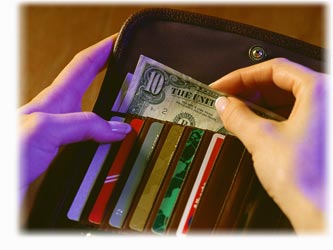April 2006:
From Cash to Credit: How to Answer,
"And How Would You Like to Pay Today?"
 Decisions, decisions. In today's marketplace it seems we almost have too many payment options. Before shopping, know when to use plastic, cash, a debit card, checks, or store financing. The right method could save you a bundle.
Decisions, decisions. In today's marketplace it seems we almost have too many payment options. Before shopping, know when to use plastic, cash, a debit card, checks, or store financing. The right method could save you a bundle.
Use a credit card for...
Expensive purchases. If items are defective or service substandard, you can dispute the charges with your creditor (attempt to resolve the matter with the company first, of course). Credit cards come with powerful consumer protection laws.
Hotel and vehicle reservations. Plastic is perfect for securing hotel rooms and rental cars. While you can use a debit card, more than you intend to spend may be held as security against future damages and other charges. These holds can block your ability to access some of the money in your checking account.
Internet shopping. Credit cards are often the best choice for online shopping. Again, the built-in consumer protection laws are on your side: if the items never arrive or aren't what you ordered, you can settle disputes easier than with other methods.
Tip: Remember, a credit card is a payment tool. Only spend what you can repay in full by the time the bill comes in, otherwise you'll wind up in debt – fast.
Use a debit card for...
Daily expenses. Whether you're treating friends to lunch or buying a new outfit, a debit card is the ideal way to pay. Money is electronically taken from funds you already have, so you won't face an unwelcome bill at the end of the month. Also, because every debit card purchase is recorded on statements, tracking spending is virtually effortless.
Tip: Always confirm your balance before paying with a debit card. As with a check, it is possible to overdraw your account – which will result in a hefty penalty.
Use a check for...
Household bills. Good old paper checks are still useful for such expenses as utilities, rent, and childcare payments. Or opt for Internet checking with online bill pay – most financial institutions offer the service for free and it's a simple point and click way to take care of at least a few of your regular bills.
Tip: Invest in a pen with gel-based ink specially made for check writing – with it, thieves can't launder the checks without destroying the paper itself.
Use cash for...
The little things. Cash is perfect for the inexpensive items you need for your every day routine, from vending machine snacks to newspapers. It is simply the fastest and most convenient way to pay – no signature or PIN required.
Tip: Even small items add up! Keep receipts or write down purchase details. You'll need this information for tracking purposes if you want absolute accuracy.
Use a retailer's financing...
When it's interest-free. Zero-interest offers from retail stores can really work to your financial advantage (free financing on large purchases is pretty amazing). Be sure to pay in full before the contract expires though – or you'll be responsible for every penny of the interest you would have paid if the deal never existed.
Tip: Divide the purchase price by the number of months you have before the deal ends. Pay that amount each month, not the minimum payment, and mark your calendar with the date you need to make your final payment.



